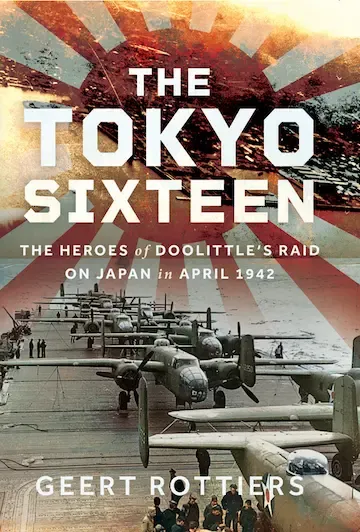Raider in the spotlight
The story of Robert W. "Bob" Wall losing an arm on the USS Hornet.
DOOLITTLE RAID ACCIDENT ABOARD USS HORNET
Robert W. Wall was born on August 20, 1919, in House, New Mexico. After joining the Navy, he first served aboard the light cruiser USS BROOKLYN (CL-40) before being reassigned to the carrier USS HORNET (CV-8). In April 1942, HORNET carried the sixteen Mitchell B-25 bombers of the U.S. Army to the Eastern Pacific where they launched in the bold retaliatory Doolittle Air Raid which bombed mainland Japan in retaliation for the attack on Pearl Harbor which had occurred only a few months before.
The seas had been moderately rough during the transit from San Francisco but by April 17 the winds had increased, were gusting to 45 mph and the seas had become very rough. When a Japanese boat was sighted and suspected of having radioed an alert to Japan that the task force had been discovered, it was deemed prudent to immediately launch the bombers despite the adverse weather, and the pitching and rolling flight deck. As fourteen planes were successfully launched, the fifteenth plane was readied and was being held down by restraining ropes that had been untied from the deck. Seaman First Class Wall was one of the crewmembers holding a rope trying to keep the plane in position. As the ship’s bow climbed up the face of a big wave, and started down the wave’s backside, the bomber’s nose wheel jumped up off the deck and Wall was unexpectedly yanked into one of the plane’s propeller arc. Wall’s left arm was severely mangled and he was also struck in the rump before being knocked to the deck.
Sailors hurried to carry Wall down to the carrier’s sick bay where doctors and corpsmen stopped the bleeding, then x-rayed his mangled arm. The prognosis was very bad and a medical officer summoned the ship’s chaplain and told him Walls arm would have to be taken off. The chaplain was asked to console Wall who pleaded, “Please don’t let them cut it off.” Sensing Wall’s desperation, the chaplain sat alongside him and in an impromptu speech told Wall there wasn’t a man on board, from the skipper down, who would not sacrifice an arm to help make the mission a success and is recalled saying, “The crew of that plane has a mighty slim chance of getting through alive. Compare yourself to them. There is a serious danger that they will be shot down or crash. They knew that and nevertheless they went ahead. You have already made your sacrifice toward the success of that mission. May theirs be no more serious than yours.” The chaplain watched as Wall regained his composure, then nodded. The doctor appeared moments later and Wall said, “All right, Sir. Let’s get on with it.” Later when crewmembers learned of Wall’s plight, a collection on his behalf was taken. When he was presented with $2,700, Wall broke down in tears.
Because of his injuries, Wall was honorably discharged from the Navy and settled in San Diego, California, where he married a Navy nurse and became an employee of Ryan Aeronautical Company. He completed a successful career with Ryan in 1981. Robert W. Wall died on September 19, 2002, and was succeeded by his wife of more than 60 years and several children. His obituary carried the note that Wall lived by the motto, “There is no such word as can’t.”
>ritten and researched by CDR Roy A. Mosteller, USNR (Ret)
The Heroes of Doolittle's raid on Japan in april 1942
by Mr. Geert Rottiers
The book will be available soon.

